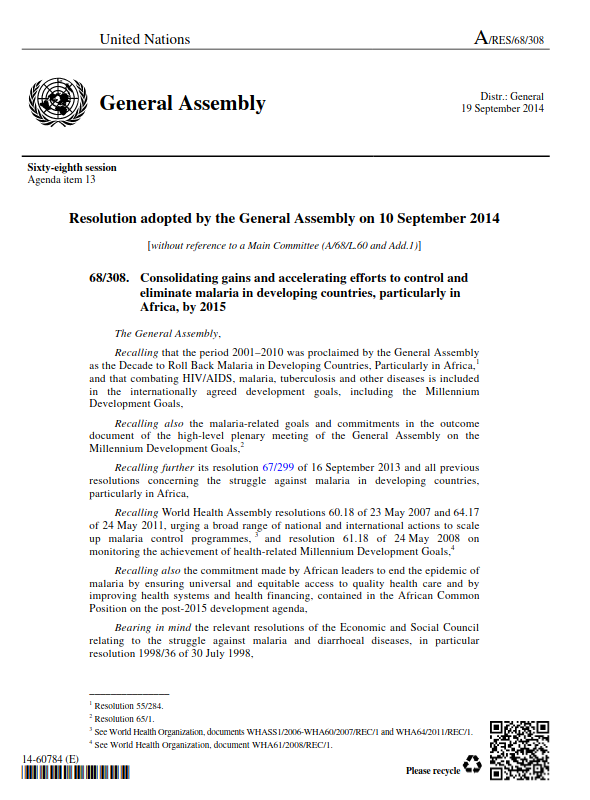2014 Resolution on efforts to control and eliminate malaria by 2015
Analysis of precedential value
The UN General Assembly (UNGA) adopted this resolution without a general vote in September 2014. The UNGA is the preeminent governing body of the UN system and consists of all 193 UN Member States. According to the UN press team, this resolution signalled UNGA’s “calling for increased support for the implementation of international commitments and goals pertaining to the fight to eliminate malaria.”
Used as precedent
access to health products
“Urges the international community, inter alia, to support the Global Fund to Fight AIDS, Tuberculosis and Malaria to enable it to meet its financial needs and, through country-led initiatives with adequate international support, to intensify access to affordable, safe and effective antimalarial treatments, including artemisinin-based combination therapies, intermittent preventive therapies for pregnant women, children under 5 and infants, adequate diagnostic facilities, long-lasting insecticide-treated mosquito nets, including, where appropriate, through the free distribution of such nets and, where appropriate, to insecticides for indoor residual spraying for malaria control, taking into account relevant international rules, including the Stockholm Convention on Persistent Organic Pollutants standards and guidelines.” (paragraph 13)
“Recognizes the importance of the development of safe and cost-effective vaccines and new medicines to prevent and treat malaria and the need for further and accelerated research, including into safe, effective and high-quality therapies, using rigorous standards, including by providing support to the Special Programme for Research and Training in Tropical Diseases, through effective global partnerships, such as the various malaria vaccine initiatives and the Medicines for Malaria Venture, where necessary stimulated by new incentives to secure their development, and through effective and timely support for the pre-qualification of new antimalarials and their combinations.” (paragraph 20)
“Calls upon the international community, including through existing partnerships, to increase investment in and efforts towards research to optimize current tools, develop and validate new, safe and affordable malaria-related medicines, products and technologies, such as vaccines, rapid diagnostic tests, insecticides and their delivery modes, to prevent and treat malaria, especially for at-risk children and pregnant women, and testing opportunities for integration in order to enhance effectiveness and delay the onset of resistance.” (paragraph 21)
“Reaffirms the right to use, to the fullest extent, the provisions contained in the World Trade Organization Agreement on Trade-Related Aspects of Intellectual Property Rights (TRIPS Agreement), the Doha Declaration on the TRIPS Agreement and Public Health, the decision of the General Council of the World Trade Organization of 30 August 2003 on the implementation of paragraph 6 of the Doha Declaration on the TRIPS Agreement and Public Health, and, when formal acceptance procedures are completed, the amendment to article 31 of the Agreement, which provide flexibilities for the protection of public health, and in particular to promote access to medicines for all and to encourage the provision of assistance to developing countries in this regard, and calls for the broad and timely acceptance of the amendment to article 31 of the Agreement, as proposed by the General Council of the World Trade Organization in its decision of 6 December 2005.” (paragraph 23)
universal health coverage
“Requests relevant international organizations, in particular the World Health Organization and the United Nations Children’s Fund, to assist the efforts of national Governments to provide universal access to malaria control interventions to address all at-risk populations, in particular young children and pregnant women, in malaria-endemic countries, particularly in Africa, as rapidly as possible, with due regard to ensuring the proper use of those interventions, including long-lasting insecticide-treated nets, and sustainability through full community participation and implementation through the health system.” (paragraph 14)
